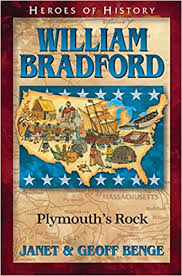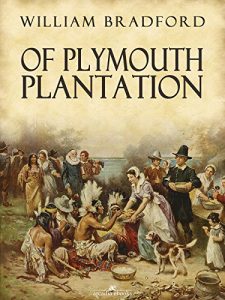“‘Blessed be the God in heaven who has brought us over this vast and furious ocean,’ he prayed, ‘You have delivered us from the perils and miseries at sea and set our feet on firm and stable ground–our proper place to dwell. For this we thank You and bless You.'”
Listener’s Guide:
Use the time stamps below to skip to any part of the podcast.
0:43 Update on hard copies of The Mission Driven Life book, Podcasts, and Cottage Meetings
6:00 William Bradford’s early years
9:40 Bradford’s education
11:55 King James’ reforms and Puritanism
14:35 Bradford tries out Puritanism
16:30 Bradford’s attempts to escape
18:54 Conditions in Holland
21:28 The decision to move to the New World and the search for investors
25:35 Merchant Adventurers change the deal and they sail to America
29:55 The Mayflower Compact and the first prayer
35:00 Samoset and Squanto arrive and help the Puritans
38:00 Plymouth colony and Massasoit sign a peace treaty, the “First Thanksgiving”
40:11 Merchant Adventurers make things harder
42:40 Principles Bradford honored and led with
Quotes from this episode:
*All quotes from William Bradford, Plymouth’s Rock by Janet and Geoff Benge and Of Plymouth Plantation: The Pilgrims in America by William Bradford
“Williams was a good student and soon mastered reading, writing, and arithmetic. Most of all, he enjoyed reading, in particular, one book his tutor loaned him, Foxe’s Book of Martyrs.”
“Tears ran down the faces of the Separatist men as they looked back in horror, realizing that their wives and children and their fellow Separatist men were being left behind and they were helpless to do anything about it.”
“It was challenging to feed and clothe everyone…everyone had to work hard to raise the money needed to survive. Even the children, some as young as four years old, had to work…The truth was, if a family could not make enough money, they were in danger of starving to death…A number of people lived in cramped quarters, where disease was a constant threat. Several children had died, including the Brewsters’ new baby. Many families worked with linen, and over the years, tiny, wiry flax fibers had lodged in their lungs, making it hard to breathe.”
Mayflower Compact:
“In the name of God, Amen. We, whose names are underwritten, the loyal subjects of our dread Sovereigne Lord, King James, by the grace of God, of Great Britaine, France and Ireland king, defender of the faith, etc. having undertaken, for the glory of God, and advancement of the Christian faith, and honour of our king and country, a voyage to plant the first colony in the Northerne parts of Virginia, doe by these presents solemnly and mutually in the presence of God and one of another, covenant and combine ourselves together into a civill body politick, for our better ordering and preservation, and furtherance of the ends aforesaid; and by virtue hereof to enacte, constitute, and frame such just and equall laws, ordinances, acts, constitutions and offices, from time to time, as shall be thought most meete and convenient for the generall good of the Colonie unto which we promise all due submission and obedience. In witness whereof we have hereunder subscribed our names at Cape-Codd the 11. of November, in the year of the raigne of our sovereigne lord, King James, of England, France and Ireland, the eighteenth, and of Scotland the fiftie-fourth. Anno Dom. 1620.”
“When William Brewster reached the shore, one of the first to do so, he laid down his musket and fell to his knees. The other men followed his lead. ‘Blessed be the God in heaven who has brought us over this vast and furious ocean,’ he prayed, ‘You have delivered us from the perils and miseries at sea and set our feet on firm and stable ground–our proper place to dwell. For this we thank You and bless You.'”
“William had been sure there would be tests for the Separatists, but he had no idea they would have to sacrifice so much so soon. Still, he clung to his faith in God.”
“William also saw Squanto as a special instrument sent by God as a bridge between the colonists and the Indians.”
“With Squanto serving as a translator, Governor Carver and Massasoit began to talk. Before long the two men had agree upon a simple peace treaty and mutual-assistance pact.”
“Two of Stephen Hopkins’s servants, Edward Doty and Edward Leister, got into an argument that ended in a duel. Both men were injured as a result, and William ordered them tied together until they worked out their problems.”
“William consulted with his advisors and then decided to break the agreement with the Merchant Adventurers. He would assign a plot of land to each household in the community according to its size. The members of the household would plant, tend, and raise their own corn and other crops on their plot…For William it was a joy for once to see men, women, and children gladly tending their crops. He also noticed that much more corn was planted than the year before.”
“As he looked out at the wilting corn crop…he decided to call the whole community together for what he called a ‘solemn day of humiliation’ during which they would fast and pray. The whole community, both Separatists and Strangers, gathered in the fort on The Mount, which was also used as a community meeting hall. William ordered the doors shut, and everyone began to pray, asking God to send rain and save their crops and give them a bountiful harvest. Eight hours later, when they opened the doors the weather had turned overcast. By the following morning, rain was falling, William prayed a heartfelt thanks to God. Gentle rain continued to fall for the next two weeks. Everyone watched in amazement as the parched corn stalks that many had given up for dead burst back to life.”
“William chose to forgive Isaac and allowed him to stay in Plymouth. While he found it hard to understand Isaac’s betrayal of his covenant with God, his church, and his fellow colonists, William felt that it was for God to judge, while it was his job to offer mercy and forgiveness.”
“But always as they talked, their voices were tinged with the regret of not being able to create in America the community they had dreamed of.”
“At the age of sixty, in 1650, William began studying Hebrew. He wrote that he wanted to study ‘that most ancient language, and holy tongue, in which God, and angels, spake.’ And although he had given up on writing his history of Plymouth, he began writing poetry and essays on spiritual topics.”
Books from this episode:



This is such a blessing at the beginning of National Bible Week’s 74 anniversary. Story telling is still the best teaching tool but the add-ons; texts, references and especially the listeners guide are rarely if ever found in other online education. This effort is precious and perfectly timed for a holiday that needs more reverence and devotion for the book that birthed our nation. Bravo and and blessings to you and prayers to your students and family who are the luckiest students of all.
Thank you Bob! So grateful for your continued support and hard work to make our world a more Godly, principled place!